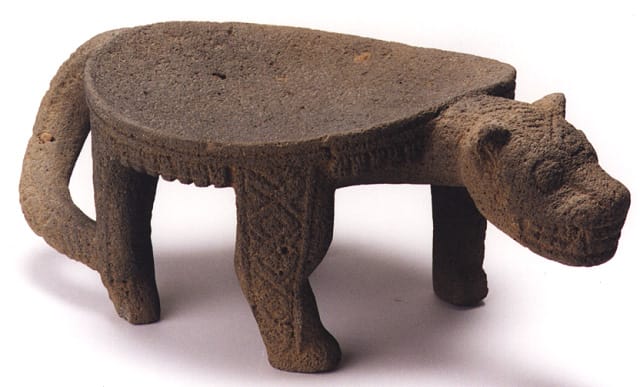Atlantic Watershed Basalt Metate in the Form of a Jaguar, 700 CE - 1000 CE
Basalt
10 x 6.5 x 16.5
PF.2371
Zoomorphic-effigy grinding stones such as this powerful stone jaguar metate, masterfully carved from a single piece of volcanic stone, were extremely important ritual objects in Ancient Costa Rica. Like all...
Zoomorphic-effigy grinding stones such as this powerful stone jaguar metate, masterfully carved from a single piece of volcanic stone, were extremely important ritual objects in Ancient Costa Rica. Like all mankind, the Ancient Costa Ricans sough to relieve the uncertainty of death. This quest for immortality and reverence for ancestors led to elaborate burial practices. The metate as a grinding stone in every-day life had the transformative 'power' to change a seed or kernel into flour. Because of this power, the metate became a symbol of transformation in the human life cycle. When it was placed in a tomb it represented the human transformation of rebirth, the beginning of a new life cycle. This striking metate, carved in the stylized shape of a jaguar displays yet another symbol of extreme importance to Ancient Costa Rican society. The jaguar was regarded as the most powerful animal in the world, to be honored and revered; it even had certain divine characteristics. In mythology, the most important God, Maira, became the sun during the day, making the long journey from east to west over the lands. At night, however, Maira assumed the form of a jaguar and stealthily made his way from west to east, where in the morning he would rise again in the form of the sun. These commanding attributes of transformation and power are artistically portrayed in this stunning jaguar metate. The powerfully carved head with its snarling teeth, the curled tail that appears to be twitching dynamically from side to side, the slightly bent legs with their skillfully carved patterns, all combine to give this feline a timeless aura of respect and power, befitting its ancient ceremonial function. As we behold this feline creature today we realize that the reverence with which this metate was afforded in antiquity clearly extends into present day.



